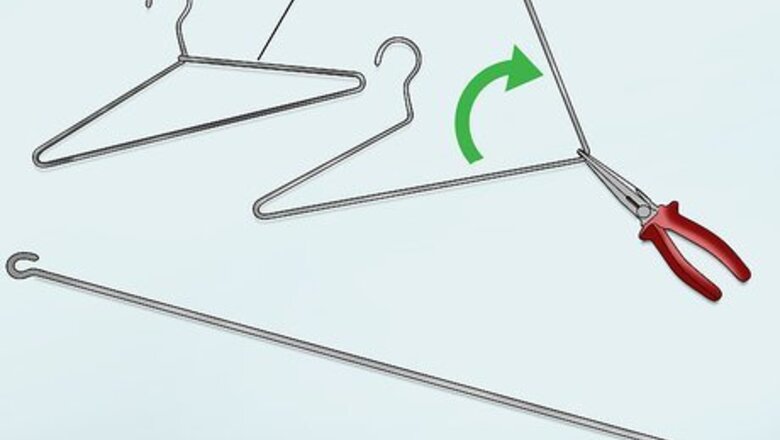
views
Unlocking Post Door Locks
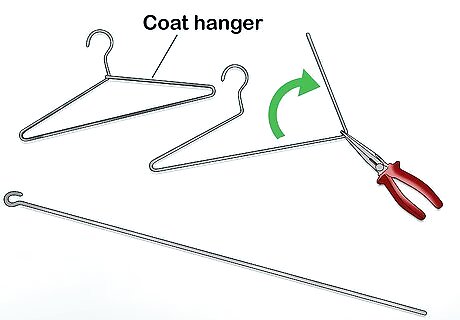
Straighten out the hanger. Stretch out the wire so that it is long enough to reach the unlock button or the post. Untwist the hooked portion, then straighten it completely, leaving only the curved end in its original shape. To unwind the part of the wire hanger that is twisted around itself, it helps to use a pair of pliers. The coat hanger should be shaped like a relatively straight line with a curved hook on the end when you’re done. According to Locksmith Robert Vallelunga, "Clothes hangers are the most popular home-made “tool” we see customers attempt to use because they most closely resemble the long reach tool used by locksmiths. [...] In some newer, high end models, this can lock the car down, so proceed at your own risk." You may want to wear gloves while untwisting the hanger to avoid poking yourself in the hand. Using pliers will make untwisting the hanger easier.
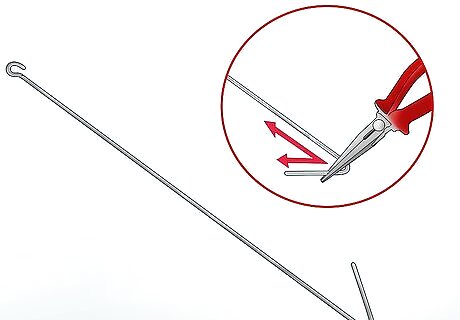
Bend the hook into a “V” shape. You will need to bend the hook of the coat hanger down into a shape that can grip the door lock post. A small “V” or check mark shape will be the easiest shape to fit through a small gap that can also do the job. Use a pair of pliers to fold the end of the straightened coat hanger until the span of the check mark is tight enough to hook the post. Many door lock posts have a groove or ridge that will make it easier to grip when using a coat hanger for this purpose. You may need to bend the hanger into a few different sized check marks or “V” shapes until you have one that will grip the post.
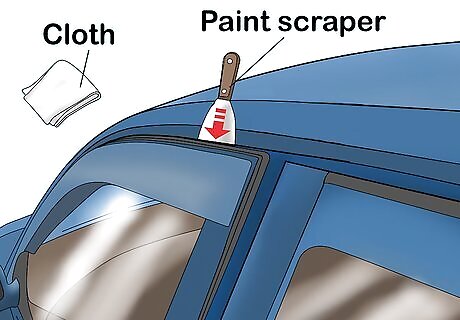
Pry the window out slightly if it is closed. If the window is open slightly, you will not need to pry it out at all. However, if the window is shut, you will need to slide a narrow wedge into the gap between the window and door frame and pry the window out away from the vehicle. Be extremely careful doing this, as applying too much pressure will break the window. A wider prying surface such as a paint scraper is a better choice than something narrow like a screwdriver. Once pried open, place something like a folded up piece of cloth or rubber into the gap to hold it open.
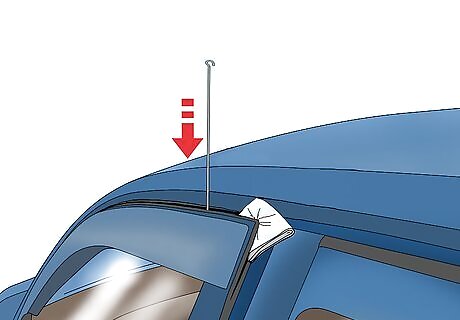
Slide the hanger into the gap. According to locksmith Robert Vallelunga, "Long reach tools are slid in the crack between where the door and the roof of the car meet." Grip the end of the coat hanger that is opposite from the “V” shape you made with pliers. Slip the hanger into the gap you created between the window and door frame. If the lock post is too close to the rear side of the car door, you may need to approach it from the front instead. It is important that you get to the post in a direction that allows you to apply pressure to it as you pull it up. Be careful not to put additional pressure on the window as it’s pried open or you may break it.
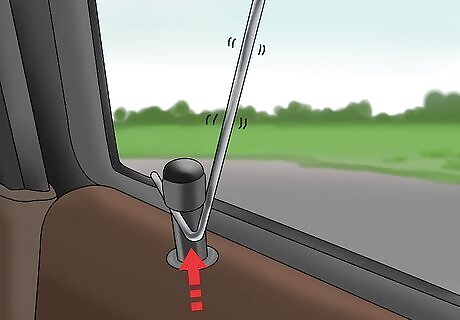
Catch the post and pull up and toward the back of the car. Wiggle the hanger around until you catch the post, then apply pressure by pulling the hanger back toward the rear of the car. If the lock is too close to the rear side of the window, try applying pressure forward as you pull it up. Continue to apply pressure as you pull the post up to unlock the door. If the post pops up, the door will be unlocked and you can open it. You may need to try multiple times if the hanger slips off of the post.
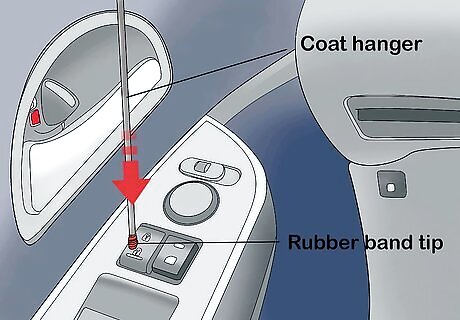
Press the unlock button if you can reach it. Snake the bent coat hanger through the window crack and hit the unlock button with the tip of the wire. Be patient. This may take a number of tries, depending on the size of the window crack and the layout of your particular car. If you're having trouble hitting the unlock button with the tip of the coat hanger, try adding a small bit of rubber to the end. Wrap a small rubber band around the tip, for friction, or impale an eraser on the wire. This might help you get a better handle on the button surface.
Pushing or Pulling Slide Locks
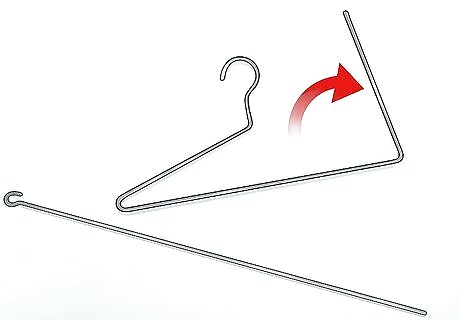
Straighten out the hanger and bend it again as necessary. In order to reach the lock slider for push or pull locks, you will need to straighten the hanger out, then bend it again in the right manner to reach the it. Depending on your vehicle, this may require a number of bends or few at all. You may need to guess and check the proper bends in the coat hanger a few times in order to get it right. Try not to bend the hanger too far, as bends will reduce its ability to press or pull directly on the slider.
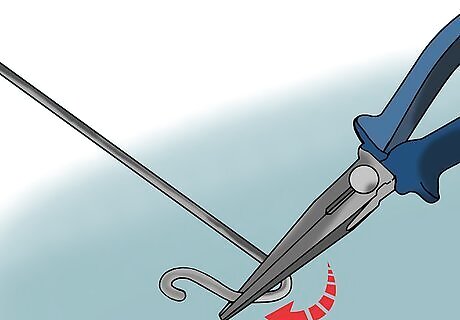
Bend the hook into a short hook or ledge to push or pull the slide. If you need to pull the slider to unlock it in your vehicle, you will want to bend the end of the hanger into a hook that can snag the ledge on it. If you need to push it, it’s more important that you bend the tip in such a manner that can put the force necessary on the slider to push it over. Use a pair of pliers to make a small, strong hook or ledge. If you are sliding the hanger in the gap in the door frame instead of a window gap, it will need to be very thin.
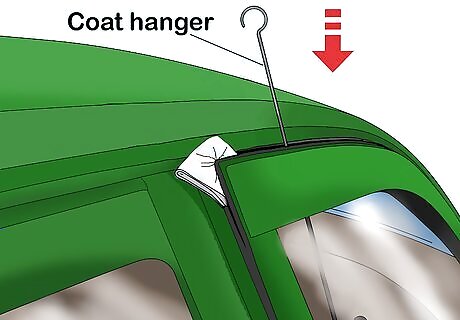
Slide the hanger between the door and door frame. According to locksmith Robert Vallelunga, you should slide the coat hanger "in the crack between where the door and the roof of the car meet." If you are unable to pry the window away from the door frame, you will need to instead slide the hanger through the very narrow gap between the door itself and the frame. The door and door frame are separated by a thin layer of weather proofing that you may damage in the process. Press the hanger through the weather proof layer and into the car. Some vehicles will not permit the hanger to pass through because of the angle. You will then have to find a way to pry the window away from the door. If you tear the weather proofing, you will need to replace it or the door may leak.

Have a friend guide you from the passenger side. Once the tip of the hanger is inside the cabin of the car, you may not be able to see the slide for the door lock from your position. Ask a friend to stand on the passenger side of the car and guide you by looking through the window. You can still find the lock without a second pair of eyes, but enlisting some help will make the process far easier. Be patient and continue trying until you are able to snag or press the slide.
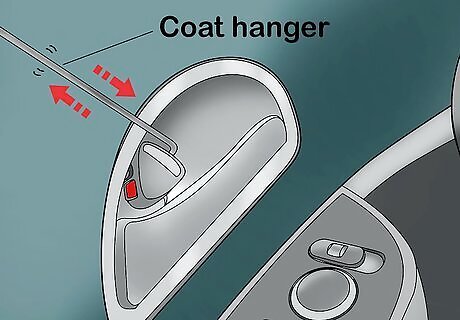
Press or pull on the slide to unlock the door. Locksmith Robert Vallelunga explains, "You grab the door handle on the opposite side of the car, and pull it to release the door." In other words, once you get the hanger on the slide, push or pull it as necessary to unlock the door. This may take a number of tries and you also may need to make changes to the bends in the coat hanger in order to get to the slide from the right angle. Be patient and continue trying until you are able to snag or press the slide. Be careful not to do further damage to the weather proofing as you move the hanger around.
Making a Slim Jim from a Coat Hanger
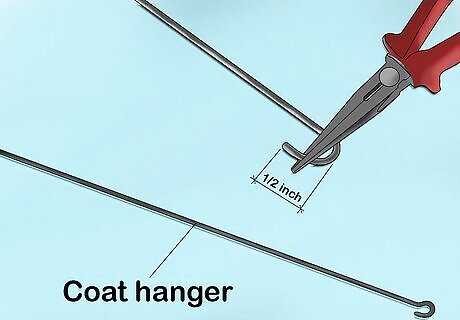
Straighten the hanger except for a short hook at the end. Just as with other methods, you will need to unfold the hanger and straighten it, except for the end. Use a pair of pliers to form a short hook at the end of the hanger. Leave only a half inch or so as the lip of the hook, while leaving the rest of the hanger straight. You may need to bend the hook a few times in order to get it right. Make sure the rest of the hanger is a fairly straight line.
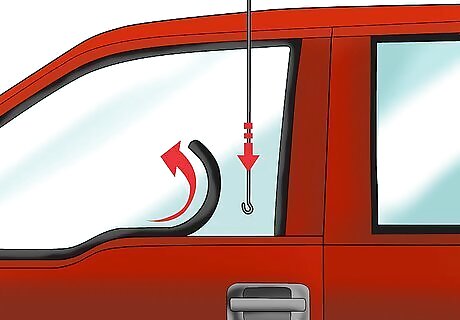
Slip the hanger between the window and the weather stripping. There should be a length of black rubber weather stripping running along the lower edge of your car window. Peel this strip back from the window a bit using your finger, then gently insert the curved end of the coat hanger into the gap between the window and the rubber. You should be able to lower the coat hanger into this gap a few inches without encountering much resistance. You may have to replace the weather stripping if you damage it during this process. It may be easier to insert the hanger with the hook facing the front or rear of the vehicle.
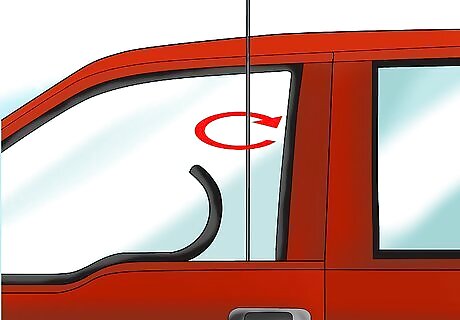
Turn the hanger so the hook is facing the interior. With the hanger and hook inserted in the door, rotate it until you believe the hook is facing the inside of the car so it can catch the lock bar inside the door. It may be difficult to determine which way the hook is facing inside the door; you can mark one side of the hanger with a marker to make it easier to keep your bearings. The hook will need to face inward in order to grip the lock bar. You may need to try a number of times in order to get this method right.
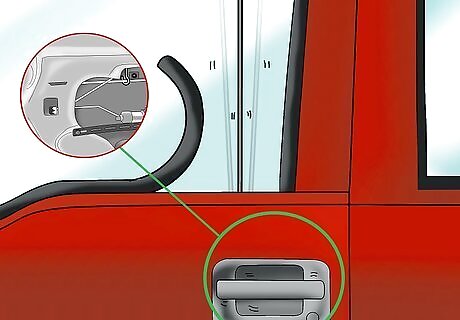
Move the hanger side to side until you see the lock move. As you move the hanger back and forth, it will come into contact with a bar or pin that controls the lock post and door lock. Try to pull up on the pin or bar to disengage the door lock. It will usually be located about 2 inches (5 cm) below the bottom of the window, near the interior door handle. Different vehicles may have different interior door designs, so this method may not work on all vehicles. Do not use excessive force when pulling up on the pin or bar. Because you can’t see inside the door, you may be snagged on the wrong thing. In some vehicles you will need to pull the pin or bar back toward the rear of the car instead of up.
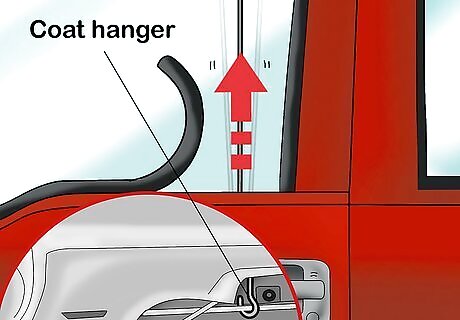
Pull up or back on the area that moves the lock. If you see the lock move slightly when your hook catches a bar or pin inside the door, try to pull up or backward on the bar you’ve come into contact with to disengage the lock. If you catch the bar properly, it should not take too much force to move the lock. Pulling up and toward the rear of the car can help ensure you have leverage on the bar or pin as well as improving the odds that you get it right for your specific vehicle.
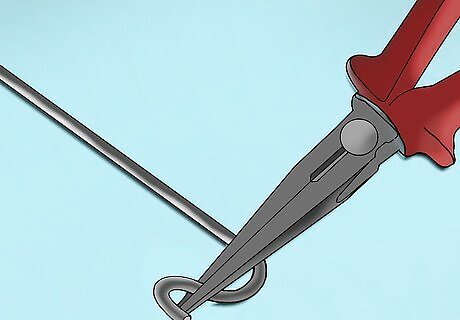
Keep trying and reform the hook as needed. This method is extremely difficult, as you can’t actually see what is going on inside the door and vehicles each have slightly different designs. You will need to continue to try until you are able to catch the bar in just the right manner and pull it with enough force to unlock the door. Be careful not to damage the weather strip on the door. Damaging your car will ultimately cost you more than hiring a professional to open the car. You may need to re-bend the hook if you pull too hard on the wrong part inside the door.




















Comments
0 comment